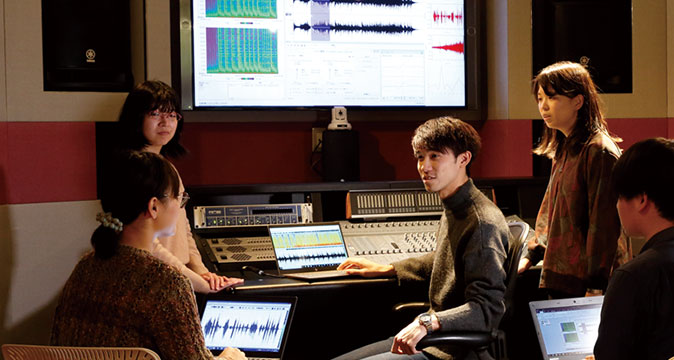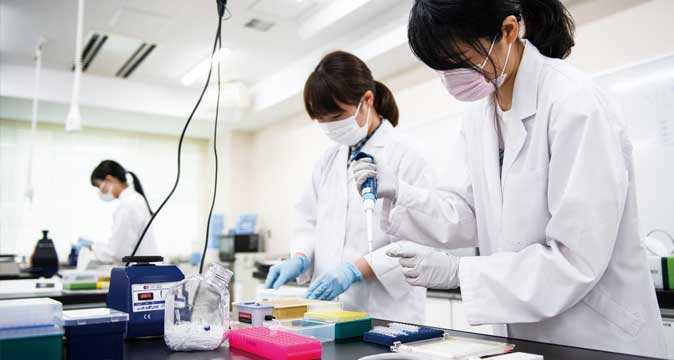(2) Advanced Research and Career Support Initiatives in Graduate Schools
In the area of career development and research support in the Ritsumeikan University Graduate Schools, a central role has been played by the career path support program which has been conducted over four terms to date. This program was launched in AY 2007, prior to R2020, under the title of Doctoral Career Path Development Support, and phase 1 operation ran from AY 2007 to 2009. This was followed in the first half of the R2020 period by phases 2 (AY 2010-2012) and 3 (AY 2013-2015) terms. For phase 3 the title was changed to Graduate School Career Path Support, with the Doctoral Career Path Support Center being reorganized as the Graduate Career Path Support Center (from AY 2013). The aim of this reorganization was to expand the program’s scope in phase 3 to provide comprehensive support for all graduate students including those in Master’s programs, rather than focusing mainly on Doctoral students as was the case in the first and second terms. The Graduate Career Path Support Center has also earned high praise from graduate schools at other institutions for transcending the boundary between education and research and developing and implementing support programs from a more holistic standpoint.
The first half of R2020 (up to phase 3) saw the establishment of a number of new research support programs that continue to operate today: the Prize Fellowship for the Doctoral Degree Students S, Prize Fellowship for the Doctoral Degree Students A, Prize Fellowship for the Doctoral Degree Students B, International Research Grant, Domestic Academic Conference Scholarship, International Academic Conference Scholarship, and the Grant for Student Research Societies.
Career path support initiatives during phase 4 (AY 2016-2020), which is the second half of the R2020 plan, included the establishment of the Grant for Publication of Doctoral Dissertation, the Scholarship for Overseas Joint Research, and the Program to Support the Submission of Academic Papers in English (all in AY 2017). At the same time, graduate school tuition fees were reduced as part of academic policies designed to achieve quantitative and qualitative advancement of the graduate schools, with the reduced levels applied to both new and current students from AY 2017. Furthermore, new systems for academic RAs and newly-appointed research fellows and assistant professors came into operation in AY 2018 and AY 2019 respectively. A number of other programs, including the Domestic Research Grant and the Internship Scholarship for Doctoral students, were launched around the same time, along with the full-scale rollout of a variety of programs to support career development and research beyond the provision of scholarships and grants. With regard to the latter, one of the pioneering initiatives was the Premier Leadership Ph.D. Program to Innovate Active Life Society: Advanced Industry-Academia Collaboration, launched in conjunction with an application to the national government’s AY 2018 Doctoral Program for World-leading Innovative & Smart Education. Ritsumeikan University is also involved in the Collaborative Program for Innovative Talent Development (known from AY 2022 as the Integrated Doctoral Researcher Development Partnership System), launched in AY 2019 with Hokkaido University as the representative institution and several other universities involved.
Building on these reforms pursued under R2020, in AY 2021 we launched the Ritsumeikan University NEXT (New Educational Xross-Training) Fellowship, an initiative to connect career development and research support more progressively to the R2030 vision. This NEXT Fellowship has been selected for funding under MEXT’s University Fellowship Creation Project for Innovation in Science and Technology. The NEXT Fellowship program provides support to Fellows (selected Doctoral students) participating in research projects in “development hubs” selected from among the diverse interdisciplinary research centers within Ritsumeikan University. The aim is to enable Fellows to collaborate with researchers working at the front lines in different fields, obtain advanced specialist expertise and cross-disciplinary perspectives, and grow into high-level specialists equipped with the capacity to develop real-life applications for their research. This aim accords with the basic direction of the R2030 Challenge Design, and represents a groundbreaking initiative for concretization and implementation of the Challenge Design in the area of graduate schools policy. Furthermore, in AY 2021, Ritsumeikan University applied for the Japan Science and Technology Agency’s (JST) Support for Pioneering Research Initiated by the Next Generation, a program designed to support talented doctoral degree holders as a new generation of researchers. Ritsumeikan University’s successful application, titled the Ritsumeikan Advanced Research Academy (RARA) Next-Generation Researcher Support Program, involves selecting outstanding Doctoral program students as RARA Student Fellows, and providing them with extensive support to develop into research leaders for the next generation.
In addition to these initiatives, we have been developing other systems to support graduate students across many areas, including seminars (such as Career Management Seminars and Matching Seminars for Doctoral Students and Companies) and support for students to improve their English language proficiency (such as the Basic Skills Development Support Grant, Subsidy Program for Group Examinations of English Language Proficiency, English academic writing support, and online individual guidance sessions on writing academic papers in English). To help graduate students realize their preferred career paths, we are developing enhanced support systems for specific student cohorts in line with disciplinary categories and other differences.
In this way, dramatic advancements were made during the R2020 period (including the transition phase to R2030) in the area of career development support and research support for graduate students at Ritsumeikan University.
Contents
- Chapter IProgress of Plenary Council Discussions to Date and Positioning of the AY 2022 Plenary Council
-
Chapter II.Ritsumeikan University’s Initiatives from R2020 toward R2030
- 1. R2020 Initiatives
- (1) Initiatives to Realize Diverse Learning among Diverse Students (development of student learning environments)
- 1) Enhancement of learning/teaching environments in the undergraduate colleges: the core of university learning
- 2) Creating desirable career pathways that respond to society’s needs
- (2) Advanced Research and Career Support Initiatives in Graduate Schools
- (3) Development of Campus Environments for Greater Amenity and Enrichment of Learning and Student Life
- 2. Emergency Responses to the COVID-19 Pandemic and Future Outlook Based on the Pandemic Experience
- 3. Concrete Initiatives under R2030 Challenge Design
- (1) Approach to the R2030 Challenge Design
- (2) The Meaning of Expansive Recoupling of Research and Education: Seeking to Discharge Ritsumeikan University’s Mission
- (3) Further Enrichment of Student Learning and Growth
- (4) Roles Expected of Graduate Students (the “ideal graduate student” envisaged by Ritsumeikan University)
- (5) Future Advancement of Graduate School Academic Programs
- Chapter III Financial Management in the R2020 Period and Ritsumeikan University Tuition/Finance Policies for AY 2023 and Beyond
- Document



